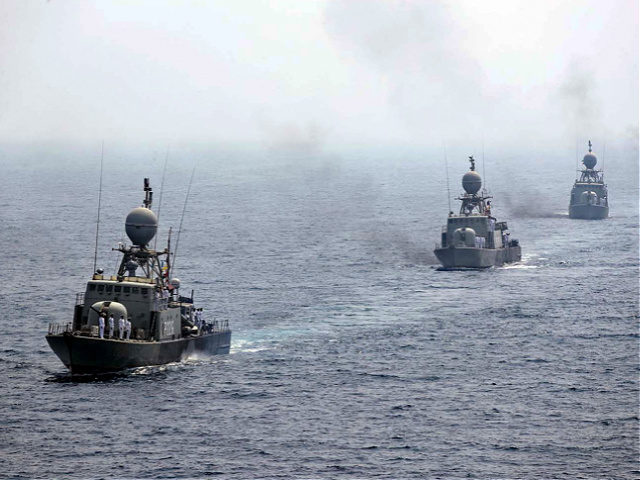A large group of Iranian military fast attack boats on Monday harassed six United States Navy ships escorting a guided missile submarine into the Strait of Hormuz, the Pentagon said.
“Earlier today a large group of Iranian Islamic Revolutionary Guard Corps Navy, also known as the IRGCN, fast boats conducted unsafe and unprofessional maneuvers and failed to exercise due regard for the safety of U.S. forces as required under international law while operating in close proximity to U.S. Naval vessels that were transiting the Strait of Hormuz,” Pentagon Press Secretary John Kirby said.
He said the Navy ships that were escorting the USS Georgia were exercising the right of transit passage in accordance with customary international law in the Strait when 13 IRGCN fast attack boats approached the U.S. formation of ships at “high speed,” getting within 150 yards.
After issuing warnings to the IRGCN fast boats, including via horn blast and bridge-to-bridge radio transmissions, the U.S. Coast Guard Cutter Maui fired approximately 30 warning shots from her 50 caliber machine gun.
He said after a second round of warning shots, the IRGCN ships broke contact.
“There was a volley at roughly the 300 yard mark and then another volley of warning shots as they got into 150 yards,” he said.
Kirby called the IRGCN’s behavior “dangerous, unsafe, and unprofessional.”
The encounter between American and Iranian ships in the region is the third one in the span of just two months.
Just two weeks ago, three IRGCN fast attack boats harassed a U.S. Navy and a U.S. Coast Guard ship in the Persian Gulf, prompting the Navy ship, a patrol coastal ship, to also fire warning shots, according to the U.S. Naval Institute (USNI) News.
And just weeks before that, in early April, three IRGCN fast attack boats and a catamaran harassed two U.S. Coast Guard cutters over a period of three hours, prompting one of the cutters to take an evasive turn to avoid a collision, according to USNI News.
Such incidents decreased during the Trump administration. Over 30 such incidents occurred in 2016 — more than two incidents per month — and into 2017, according to the Wall Street Journal, but dramatically decreased during the Trump administration.
Trump had warned in 2016 on the campaign trail as a presidential candidate that Iranian ships harassing U.S. ships and making gestures at American service members would be “shot out of the water.”
Trump also engaged in tit-for-tat strikes with Iranian-backed militias in Iraq in late 2019 after they killed an American contractor on an Iraqi base. Ultimately, Trump ordered a strike that killed IRGC Quds Force leader Qasem Soleimani, who was responsible for the deaths of American troops during the Iraq War.
Some Middle East experts say Iran’s return to regularly harassing U.S. military forces in the region reflects their lack of fear of the Biden administration as it seeks to return to the Joint Comprehensive Plan of Action that lifted economic sanctions on Iran in exchange for limits to their nuclear program.
Republicans have long blasted the JCPOA as weak, and Trump pulled the U.S. out of the agreement in May 2018.
Simone Ledeen, a senior defense policy official for the Middle East during the Trump administration, said Iran’s Monday harassment of U.S. ships “was a big show not only for us but for other countries in the region,”
“The things that are being reported coming out of those meetings [on rejoining the JCPOA] are terrifying. I think that the regime feels extremely confident in its position. They are confident we’re not going to respond. So it’s a flex, it’s a big message, and it’s very disturbing to see that,” she said.
Another expert and former administration official who spoke on background said Iran had stopped harassing U.S. ships during the Trump administration after the regime feared it was possible Trump would employ force.
Now, Iranians have zero fear President Joe Biden would ever use force — particularly given his response to Iranian proxies killing an American contractor in Iraq as well as his efforts to rejoin the JCPOA, the former official said.
The Biden administration decided not to strike the Iranian-backed militia group responsible for the contractor’s death in Iraq, and instead hit buildings that the group allegedly used in Syria. The Pentagon said some members of the militia were killed but estimates were blurry.
This, as well as Biden’s efforts to rejoin the JCPOA and infuse the regime with cash, sends a green light to harass U.S. forces in the region without fear of retaliation, the former official said.
Follow Breitbart News’s Kristina Wong on Twitter or on Facebook.

COMMENTS
Please let us know if you're having issues with commenting.